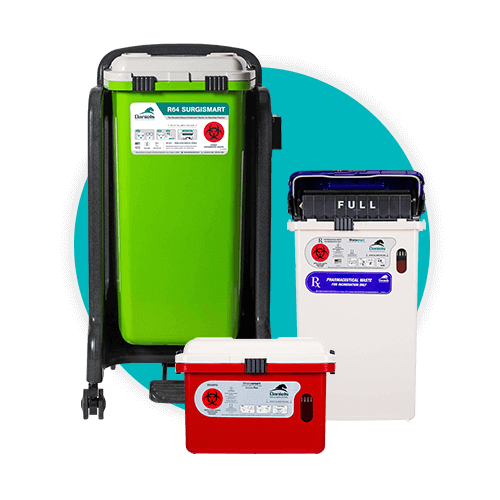Medical Waste Considerations for Hospitals

How many waste streams does a hospital deal with on a daily basis? What considerations should a hospital take for medical waste management? Of course, hospital medical waste disposal is important, but so too is on-site management of healthcare waste. How does your hospital stack up?
A single hospital can easily generate multiple waste streams. In addition to managing segregation and management of healthcare waste, the overall focus on waste minimization is just as important. Hospitals that take steps to segregate healthcare waste in an effective and efficient manner ensure compliance, lower costs, and enhance sustainability over time. Proper waste segregation in hospitals minimizes risk to employees, patients, and medical waste disposal workers from exposure to potentially infectious waste streams.
We know that hospitals are challenged by federal, state, and local legislation when it comes to healthcare waste management. The first steps toward sustainable efficiency and compliance comes with knowledge of all the different waste streams generated at your hospital facility and how to deal with them. For this reason, regularly scheduled waste audits are recommended to determine exactly what types of waste your hospital generates and in what volume.
What to do with all that medical waste?
A 2015 study estimated that roughly 5,000 hospitals located throughout the United States produce more than 7,000 tons of medical waste per day. It’s a staggering amount of healthcare waste that costs approximately $10 billion annually to dispose of.
Dealing with such high volumes of waste is certainly not cost effective and indicates inefficiency. Sustainable waste minimization in hospitals and healthcare facilities is essential in today’s healthcare environment but how do you go about it?
Daniels Health brings decades of experience in the field of sustainable, cost-effective, and compliant healthcare waste management and disposal solutions. Healthcare waste management doesn’t stop with waste segregation or calling the medical waste removal service.
Hospital facilities must be proactive. Medical waste prevention and reduction starts with a waste audit. Walk-throughs are also an important aspect for site assessment, not only in regard to compliance, but in reducing the volume of medical waste heading for landfills.
Hospital Medical Waste Optimization 
Overall objectives for hospital-based healthcare waste considerations should always include a thorough understanding of regulatory policies and how each waste stream is disposed of. There are lots of them – Daniels Health has the experience to wade through them.
Measuring the volume of waste generated in each category is also important, as is identifying the associated costs of dealing with that waste stream. Hospitals around the country are saving millions annually by adopting and embracing sustainable healthcare waste solutions.
Dealing with hazardous waste management on-site within a hospital can save tens of thousands of dollars – if done correctly. If not, non-compliance issues lead to fines and penalties. Daniels Health provides solutions that will save money and keep you compliant.
Compliance is so important. One mistake by one employee can cost a hospital thousands of dollars in penalties. All employees and departments must be familiar with - and follow - federal and state regulations for healthcare waste segregation and disposal.
Education of all personnel, regardless of department or position, in the proper handling of each waste stream is not to be underestimated in regard to reaching goals. Compliance encourages sustainability and cost efficiency as well as labor reduction. These issues are also important for hospital administrations.
Education of hospital staff is vital. Every employee from the bottom to the top must be educated in waste segregation and management, handling, and containment. Do your employees know the different handling recommendations for chemotherapy waste, surgical waste, or biohazard waste? Are they putting medical waste into the proper containers or are they mixing waste streams?
It’s not just about minimizing the burden on the environment in regard to CO2 emissions reduction. It’s about reducing the volume of waste that heads to landfills. Bottom line: it costs you money. One solution is to eliminate the use of plastic bags and increase use of reusable containers in hospitals whenever possible. Reusable containers such as those developed by Daniels enhances sustainability, with lifespans up to 10 years or more.
We help hospitals minimize hospital waste and have reduced the number of containers heading to landfills by over 32 million, which amounts to roughly 57 million pounds of plastic! That’s helping the environment and saving facilities big bucks in medical waste disposal costs big time.
A well-rounded “inside the four walls” approach to hospital-based healthcare waste management includes:
- Development of a waste plan
- Defining measurable key performance indicators (KPIs) or data that demonstrates effective achievement of facility objectives
- Optimization of waste segregation methods
- Education and compliance
- Continual reviews, audits, and improvements
For a hospital facility, medical waste considerations don’t merely have to cover the “taking out the trash” part. It’s about finding effective and sustainable ways to tackle and manage on-site hospital waste as well. That means training in collection and packaging, auditing and regulatory support, coordinating healthcare waste shipments, and knowledge on how long you can store certain types of waste on-site. Daniels provides support and on-site disposal containers that meet specialized needs for hospital healthcare waste management.
Daniels Health for compliant, efficient, and sustainable hospital waste solutions
Daniels Health is dedicated to minimizing injury risk and increasing safety for hospital environments. We work with hospitals for waste segregation improvements and increased efficiency that provides hospitals with substantial cost benefits. For compliance and education, waste optimization, and storage options, Daniels hospital solutions have produced results from facilities we’ve worked with. Call Daniels Health today – we’re ready to help save you money.
